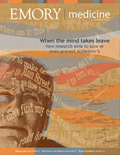Intestinal bacteria may be helping you pack on pounds
 |
You work out. You watch what you eat, and yet that stubborn spare tire wraps around your waist like a boa constrictor. You can’t get rid of it. A new finding may explain some of your frustration.
Your intestines may harbor bacteria—gut microbiota—that make those extra pounds stay put, says Emory pathologist Andrew Gewirtz.
Gewirtz and his colleagues found that mice that lack a gene called Toll-like receptor 5 (TLR5) were heavier and ate more than regular mice. TLR5’s job is to control bacteria in the intestine. But with low levels of TLR5, intestinal bacteria proliferate, triggering inflammation, which in turn can lead to metabolic abnormalities, such as insulin resistance. Mice lacking TLR5 gained weight and had high cholesterol and triglyceride levels and elevated blood pressure.
“Previous research has suggested that intestinal bacteria can influence how well energy is absorbed from food, but these findings demonstrate that they can actually influence appetite and metabolism,” Gewirtz says. “We don’t think the bacteria are directly making the mice eat more, but the bacteria are causing low-grade inflammation, which causes insulin resistance, which leads mice to increase their calorie consumption.”
The TLR5-deficient mice ate 10% more and were about 20% heavier than regular mice.
“These results suggest that one reason people might be eating more is because of changes in their intestinal bacteria,” he says. The amount and type of intestinal bacteria has changed over the years due to increased use of antibiotics, cleaner water, and improved sanitation, he says.


